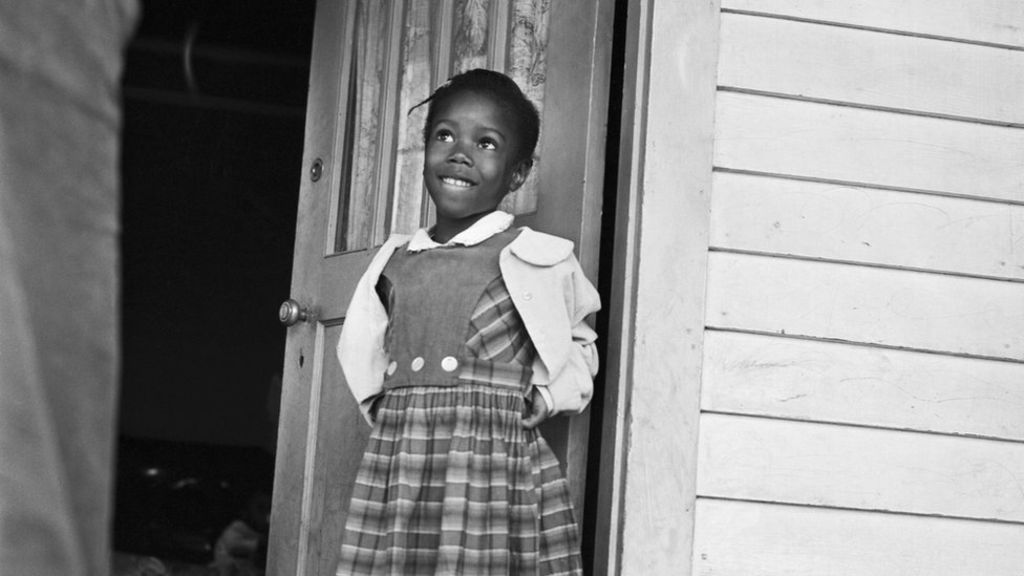Tender Steps: A Tale of Integration

"Racism is a grown-up disease and we must stop using our children to spread it."
-Ruby Bridges
On the cold morning of November 14, 1960, four federal marshals escort a girl into the building of Willia Frantz Elementary School; large crowds of people gathered in the front, yelling and throwing objects at them. There were barricades set up, and policemen were everywhere.
The girl was no petty criminal or rioter. She was Ruby Bridges, the grand-daughter of a poor share cropper and the daughter of a gas station attendant. She was a black girl living in the state of New Orleans in Southern United States. She was 6 years old.
Ruby Bridges was born in the same year that the Supreme Court of America passed a legislation mandating de-segregation of schools. The schools of the Southern states, still struggling with the idea of having to give up racial oppression of the blacks, tried to make it difficult for black children to get into these schools, by mandating an entrance test, which was deliberately made difficult. Ruby was one of the six children to pass the test. Despite her father’s concerns over the repercussions the family and the child would have to endure from the “ conservative” New Orleans society, her mother decided to send her to the (now de-segregated) elementary school five blocks away from their house.
Imagine the mental trauma caused to a six year old child when she is greeted by a crowd of people shouting and screaming all kinds of racial slurs at her. In her innocence, she attributed the ecstacy of the crowd to the Mardi Gras carnival celebration. On her second day of school, a woman threatened to poison her. After this, the federal marshals allowed her to only eat food from home. On another day, she was "greeted" by a woman displaying a black doll in a wooden coffin.
Parents of other white children stopped sending their wards to that school and as a response the teachers refused to teach Ruby alongside other white children. Only one teacher, Barbara Henry,gladly agreed to take up the task. She was from Boston and a new teacher to the school. She had to seek psychological counseling as a result of the constant racial denigration she had to face from children in the school, some of whom were as young as her.
Not that her family wasn’t “punished” for taking the bold step forwards towards social progress. For daring to wish for a better education for Ruby, her father lost his job at the gas station, and their family was essentially ostracized from their community. Her grandparents were sent off the land they had sharecropped for over 25 years.
As time passed, the situation became more and more normal for both Ruby and her family. In a year, Ruby was slowly integrated into the regular environment of the school. Her family was given support be well-wishers, from all communities, as their lives became easier.
Ruby grew up to study travel and tourism at the Kansas City business school and worked for American Express as a world travel agent. The reason I feel this incident from 1960s America is relevant in 2020, in India and abroad is, we are far from a society that sees social justice as something which should be mandatory in a civilized, democratic society. In the recent and distant history, there have been countless instances of people opposing progress for the sheer reason that they are uncomfortable with it. That does not mean we should not stand up against injustice where and when we see it.
While we cannot judge the actions of people of the past through the same lens with which we view social justice in the modern, it is important to drive people to learn from the past. The attempt of Britain to skip parts of its dark colonial history and American schools in the south to distort facts about the dark days of slavery and racial segregation is a subtle attempt to save people from the discomfort of knowing that the actions of their ancestors would, in today’s world be considered outright barbaric.
As a society we have to come to terms with a fact: whether or not racism, casteism, sexism, xenophobia etc and all other forms of injustice are objectionable, is not up for debate. Any idea that is discriminatory and oppressive in nature is to be condemned. Most of the children who refused to be friends with Ruby because of her race did so because they were convinced by their parents that racial segregation is the only acceptable way of life. Similarly, in the contemporary world, many of us have grown up in families that have instilled in us some traits and ideals that are not in tune with a world which is striving towards seeking tolerance and empathy for people of all castes, creeds, races and genders. It is our duty to unlearn them as we grow up.
We cannot allow the future generations to look at us, the way we look at the people who traumatized a six year old child for having the courage to attend a school of her choice.